Garden shade ideas – simple design and planting tips for your outdoor room
These garden shade ideas will make your garden a joy to use all day long, whether its a cooling spot for relaxing, entertaining or designed purely as a retreat
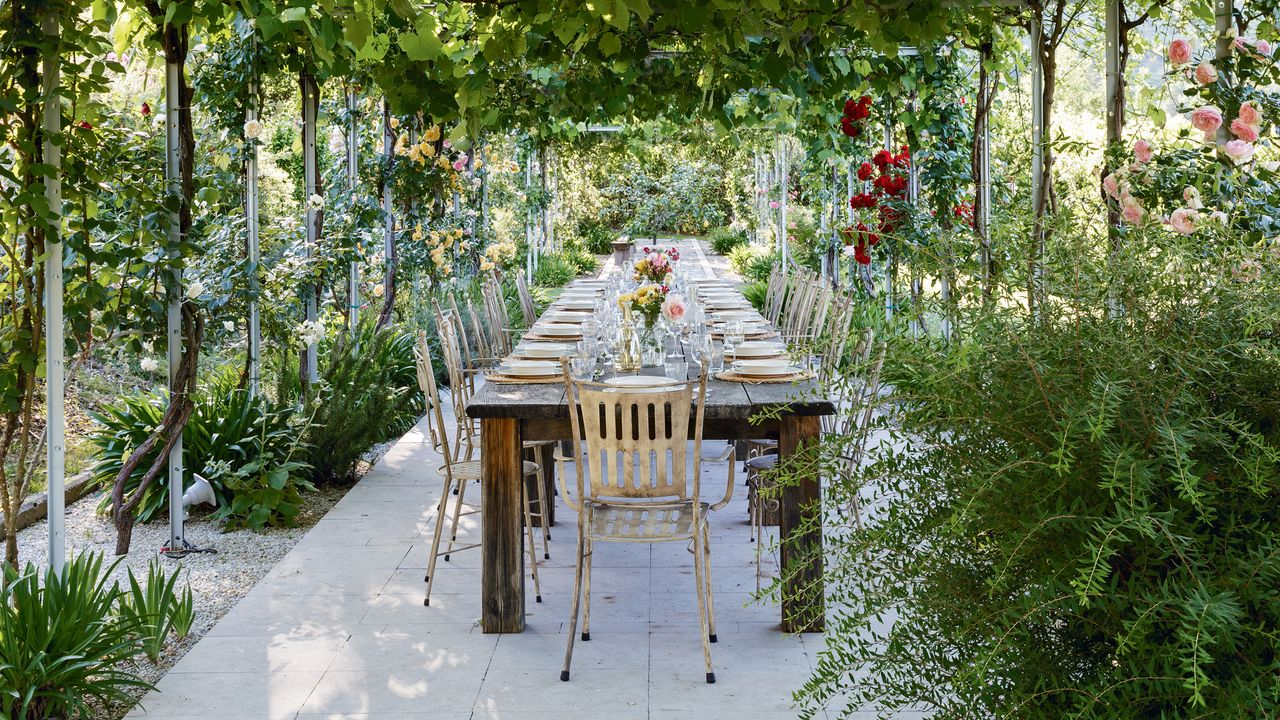

Garden shade ideas provide a wonderful opportunity to shelter from the glaring sun, create privacy in the garden, and plant unusual flora and fauna.
While they may present many unwanted challenges, the design possibilities to get creative with a shade garden are endless.
Think about a shaded spot as a multi-sensory experience of sight, sound and scent. Trickling water or swaying grass will feel cooling, while foliage is good at absorbing heat.
Our solutions for creating shade in a range of garden ideas will make an outdoor dining or seating area a pleasure to use on the bright days of summer.
Garden shade ideas
1. Create garden shade with a parasol
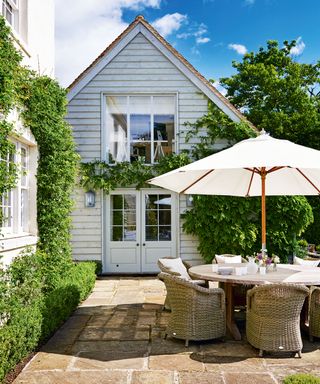
If you're wondering how to plan a garden with shade but you have limited outdoor space, then flexibility is key.
'Permanent fixtures, such as a tree or pergola, can rob an interior of light, so parasols, sails and retractable awnings are a better choice,' says Laure Chaudanson, Helen Green Design.
2. Invest in an architectural element
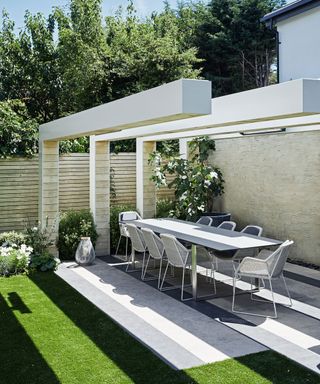
Any garden structure should be considered in relation to the house but that's not to say it needs to match exactly. Old meets new is a very popular garden decor idea right now but your choice should be sympathetic.
Here, this contemporary pergola complements the garden furniture and flooring.
3. Enhance shade with tree cover
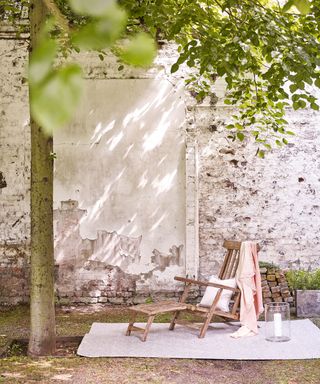
Every garden has those places you automatically drift to, as well as natural areas of shade and light.
Many houses have an east-west and south-west aspect, and parasols or sails can move with the sun, but you don't want to be always chasing the shade. If you have a big space with a terrace, you will want dappled coverage here for midday.
Trees provide excellent coverage without blocking too much sun, and can be trimmed back to suit your needs. They are also a great option if you're looking for garden privacy ideas, too.
There are also plenty of spring flowers for shade that will look beautiful beneath trees and brighten up this space.
4. Keep cool with a temporary canopy
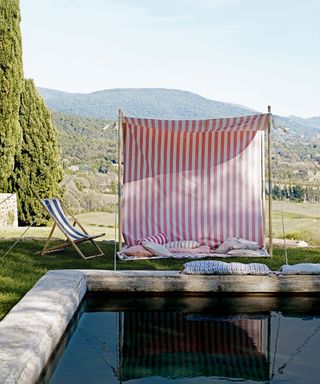
Temporary structures allow for a bit of fun and the chance to dress up the garden for a particular event. For example, an 'Indian Summer' theme would call for bright colors and stripes on parasols and canopies.
If you are after a similar design, you are in luck. Simple to construct using tent poles and guy ropes, a candy-striped canopy provides a charming alternative to a garden parasol.
5. Drape a pergola with foliage
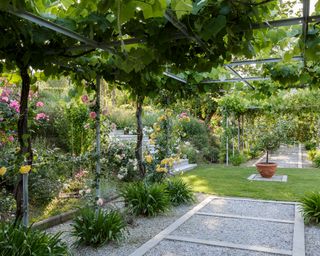
A dining space close to the house can be covered by a structure attached to an exterior wall. The oak pergola in this garden has a cover of roses and vines that provides color throughout summer and into fall.
Incorporating climbing plants into your pergola and walkways might seem like a romantic option, but the truth is that many quickly grow out of control, damaging supporting structures, so it's important to choose non-vigorous species.
6. Pitch up a colorful canopy
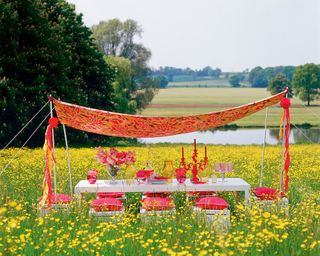
A simple fabric canopy creates shade wherever needed, and choosing a bright color and pattern will make it a feature in a large garden, too.
Outdoor fabrics have the benefit of being shower-proof, and stain, UV and fade-resistant, but an improvised shade in a sturdy interiors fabric will stand up to occasional use, too.
7. Set up a picture-perfect pergola
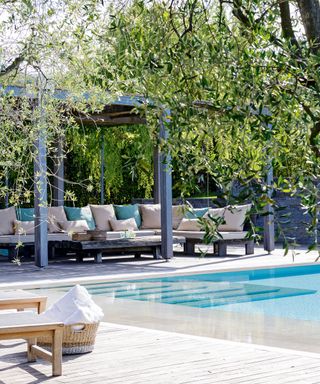
In the Mediterranean they do shade well out of necessity. Mediterranean garden ideas, such as overhanging olive trees or an area to relax in the shade under a pergola, can offer inspiration for gardens to suit all sizes and budgets.
8. Use an adjustable parasol or sail
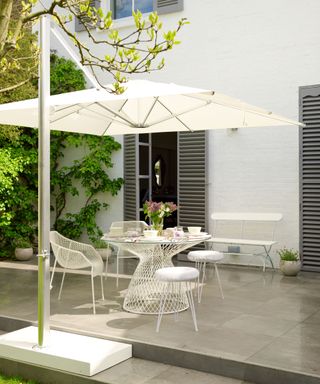
A freestanding parasol is a smart choice that won't encroach on the space or the view. Good-quality shades are built to last, but be sure to store them under cover in winter.
9. Brighten a shaded spot in your garden
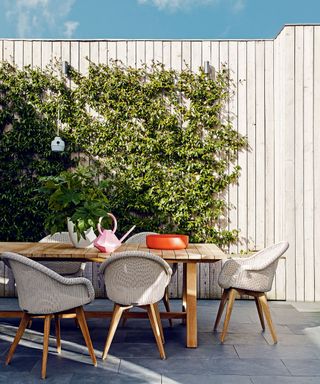
It’s no surprise that shade gardens can be a little gloomy at the best of times, but that doesn't mean you are resigned to darkness. Use flowering shade lovers, colorful containers and garden lighting to brighten the space. There are even so many plants for a shady patio to choose from.
Even the most minimal garden light fixtures will illuminate a shaded garden. Direct the flow of light in the late afternoon to highlight plant forms, such as the ones on the garden wall idea shown above. Also, highlight seating areas and patios to make the space more usable.
10. Install a retractable awning
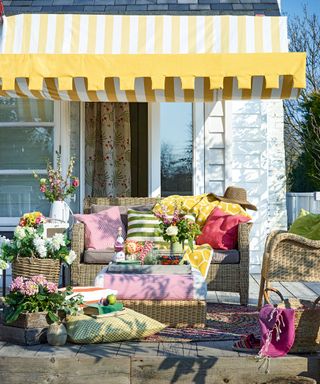
A retractable awning brings much-needed shade to the interior, as well as to a patio or terrace. Choose from neutrals for a discreet look or add a splash of colorful character with a cheery yellow and white striped design like the one shown here.
What can I do with shady areas in my garden?

Almost all gardens will have a shady spot somewhere. North-facing gardens have the area closest to the house in shade for most of the day. East-facing gardens are sunny in the morning, whereas west-facing gardens get more sun in the afternoon and evening.
There is one huge benefit to having a shaded garden – privacy. Living wall ideas that act as screens, pergola-covered terraces and tall trees are just some of the design features that will transform a shady space into a private garden sanctuary.
What grows well in a shady garden?
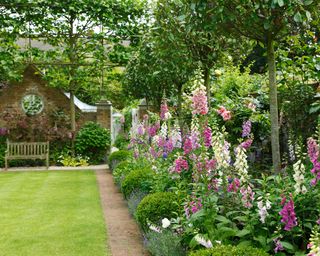
As well as many evergreens, the best plants for growing in shady gardens are: Heuchera (Coral Bells), Tiarella cordifolia (Foamflower), Lamium maculatum (Dead nettle), Digitailis (Foxglove) and Hakonechloa (Japanese grass).
Some shady spots are easier to plant than others. You’ll be dazzled by the choice for dappled shade but frustrated by the limited range for deep shade. Despite this, there are attractive plants that will grow in the darkest corner.
When looking for plants, study the pot labels. You’ll find some varieties that will only tolerate shade and others that prefer shade and actually thrive in the gloom. That’s why it’s vital to identify the type of shade you’re dealing with.
You might have a flowerbed under a tree, a border at the base of a wall, or a north-facing patio. A deciduous tree will cast dappled shade, whereas the area underneath an evergreen will be in deep shade.
Before you plant up your shady corner or border, there are a few ways you can improve the conditions to ensure great results. If you’re dealing with a dry area, dig in compost or leaf mould. Water new plants throughout and then add a layer of mulch to help lock in that moisture.
Improve drainage in damp areas by digging in grit and compost to improve soil structure. If shade is cast by trees, thin out the canopy to let more light in and cut out some of the lower branches. You’ll soon be looking at a planting display that will shine out in the shadiest of gardens.
Sign up to the Homes & Gardens newsletter
Design expertise in your inbox – from inspiring decorating ideas and beautiful celebrity homes to practical gardening advice and shopping round-ups.

Jennifer is the Digital Editor at Homes & Gardens. Having worked in the interiors industry for several years in both the US and UK, spanning many publications, she now hones her digital prowess on the 'best interiors website' in the world. Multi-skilled, Jennifer has worked in PR and marketing and occasionally dabbles in the social media, commercial, and the e-commerce space. Over the years, she has written about every area of the home, from compiling houses designed by some of the best interior designers in the world to sourcing celebrity homes, reviewing appliances, and even writing a few news stories or two.
-
 French chefs swear by this powerful food processor – and I can see why
French chefs swear by this powerful food processor – and I can see whyI made perfect hummus, pastry dough, and chopped vegetables in the Magimix food processor. Here's my professional review
By Lydia Hayman Published
-
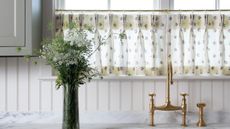 Emily Henderson's no-sew cafe curtains are unbelievably easy to recreate – you only need an iron to enjoy her French bistro-style aesthetic
Emily Henderson's no-sew cafe curtains are unbelievably easy to recreate – you only need an iron to enjoy her French bistro-style aestheticThe designer has proven that hanging curtains can be an easy DIY, with only a few accessories needed to customize a cafe-worthy look
By Hannah Ziegler Published